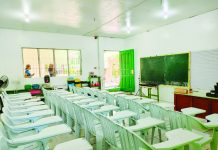
(By Dr. Joseph D. Lim and Dr. Kenneth Lester Lim, BS-MMG, DDM, MSc-OI)
PARENTS and oral health professionals are responsible for children with special needs.
They need to have the knowledge and skills to prevent oral diseases among these children, recommends a new study published in Pediatrics, the journal of the American Academy of Pediatrics.
The study, led by Dr. Lydie A. Lebrun-Harris of the U.S. Department of Health and Human Services, looked at preventive oral health services among children and youth with special health care needs.
Dr. Lebrun-Harris is a senior social scientist at the Office of Epidemiology and Research, Maternal and Child Health Bureau, Health Resources and Services Administration.
The study is based on the 2016-2018 U.S. National Survey of Children’s Health. It involved data on children 1 to 17 years old, including 23,099 children with special needs and 75,612 children without special health care needs.
The analytic sample used information on fair or poor teeth condition, decayed teeth and cavities, toothaches and bleeding gums.
Children and youth with special health care needs are those who have or are at increased risk for a chronic physical, developmental, behavioral or emotional condition.
Approximately two in 10 (19 percent) of children and youth under 18 years of age are estimated to have special health care needs in the United States. That’s about 13.6 million children and teens.
Dental caries or tooth decay is the most prevalent oral health problem among American children, 16 percent of them with untreated tooth decay.
The Lebrun-Harris study revealed that children and youth with special health care needs who have a “medical home” were more likely to receive preventive oral health services.
The U.S. National Standards for Systems of Care for Children and Youth with Special Health Care Needs recognizes that these children must have access to specialty services, facilitated through a medical home that coordinates care to meet medical, dental and social-emotional needs.
Medical home care components include having a personal doctor or nurse, having a usual source of care when sick and having family-centered care.
The study found that one in six child with special needs did not have a preventive dental visit in the past year.
More decayed teeth and cavities were reported in children with special needs.
The reasons are many: age, lower household education, non-English language, lack of health insurance, worse condition of teeth and the inability of families to provide in-house oral health care.
Smaller clinical studies reveal that children with special needs are more likely to have tooth decay.
Risk factors associated with tooth decay among these children include frequent use of sugar-containing liquid medicines and dependence on a caregiver for regular oral hygiene. Among them, the most common oral diseases are gum diseases associated with a lack of routine oral hygiene.
Dr. Lebrun-Harris says that only 29 percent or three in 10 of children with special needs receive the attention of dental health practitioners.
Unmet dental needs are caused by the inability to find a dentist as well as dental staff who are comfortable with caring for these children.
Most are seen by general dentists. However, many need pediatric dentistry, a subspecialty which requires two years of additional training beyond dental school. The training focuses on the unique needs of children and provides the skill sets necessary to care for these children.
There are about 7,600 practicing pediatric dentists in the United States. This is “inadequate to care for all” American children with special needs, says Dr. Lebrun-Harris says.
The study highlights missed opportunities to ensure all children and youth with special needs receive the necessary oral health care to prevent oral disease, such as integrating preventive oral health care into medical homes, she says.
***
Dr. Joseph D. Lim is the former Associate Dean of the College of Dentistry, University of the East; former Dean, College of Dentistry, National University; Past President and Honorary Fellow of the Asian Oral Implant Academy; Honorary Fellow of the Japan College of Oral Implantologists; and Honorary Life Member of the Thai Association of Dental Implantology. For questions on dental health, e-mail jdlim2008@gmail.com or text 0917-8591515./PN





